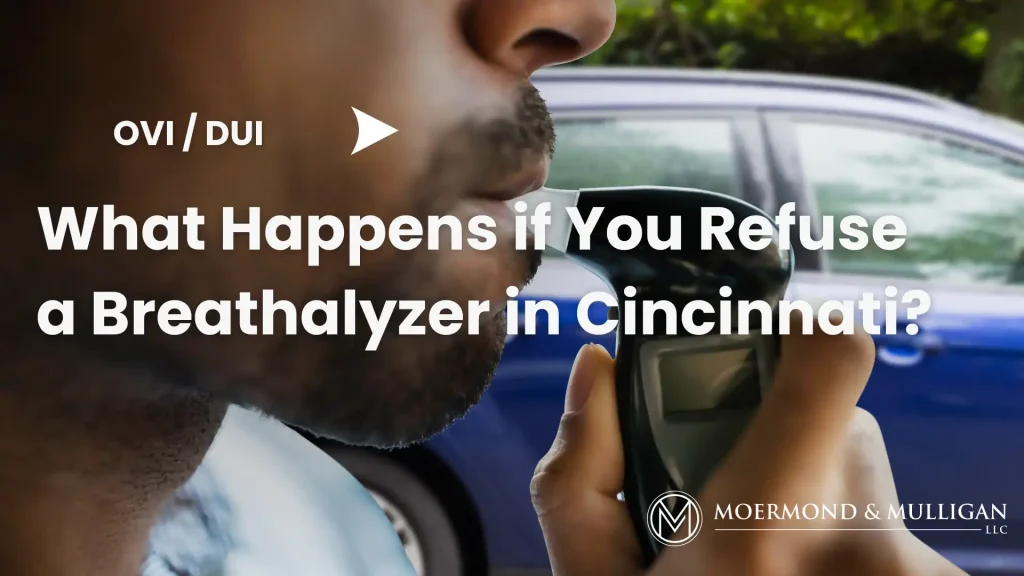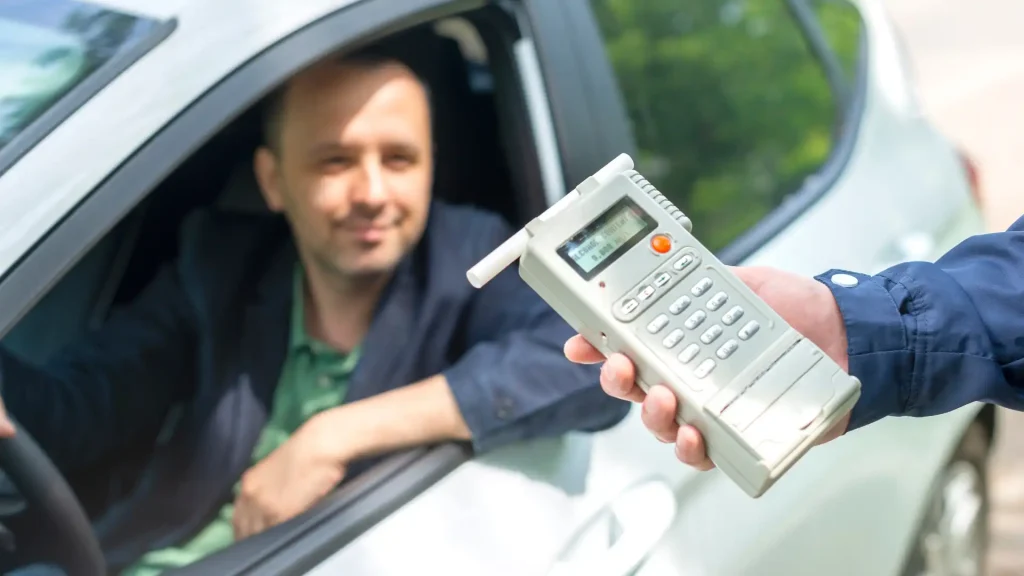Posted on Sunday, July 20th, 2025 at 9:00 am

If an officer stops you for suspected drunk driving in Cincinnati, you might face a critical decision: can you refuse a breathalyzer test? Many drivers believe refusing could protect them, but Ohio’s laws tell a different story. Understanding your rights—and the consequences of your actions—could make all the difference, especially when you’re wondering, as they use a portable device, can you refuse a breathalyzer during a traffic stop?
What Is a Breathalyzer Test?
A breathalyzer test measures the alcohol concentration in your breath to estimate your blood alcohol content (BAC). Police in Ohio use this test during DUI traffic stops to check whether you’re over the legal limit of 0.08%. The test is quick, often performed roadside, and helps officers build evidence for DUI charges. Therefore, it is essential to understand how breathalyzer tests and refusals can impact your case.
However, the results are not always flawless. Issues like improper calibration, medical conditions, or user error can affect accuracy. That’s why drivers sometimes consider refusing the test. But refusing carries its own set of risks.
Can You Refuse a Breathalyzer Test?
You can refuse a breathalyzer test in Ohio, but the law imposes significant penalties. Ohio’s implied consent and breathalyzer laws state that anyone driving on Ohio roads automatically consents to chemical testing if arrested for suspected DUI. Refusing the test triggers administrative and criminal consequences before you set foot in court.
Consequences of Refusing a Breath Test
Refusing a breathalyzer test in Cincinnati can result in severe penalties. If you refuse the test, your driver’s license may be suspended immediately. For the first refusal, your license could be suspended for one year. If you refuse again, the suspension will be increased. More refusals mean even longer suspensions.
Refusing to take the test can also harm your case in court. Prosecutors might say you refused because you knew you were over the legal limit. This can make it harder to fight a DUI charge. Additionally, the court may impose extra penalties—like jail time, fines, or probation—for refusing the breathalyzer, even though some argue that breathalyzer results can be unreliable.
Breathalyzer Refusal vs. Compliance
Many drivers wonder whether it’s better to comply or refuse. Taking the breath test can produce evidence that may be used against you. But refusing doesn’t guarantee a better outcome. A refusal can bring penalties that rival or even exceed those for a failed test.
Choosing compliance means the state has BAC evidence to use against you. However, your attorney may challenge the validity of the results. Machines sometimes malfunction, and officers don’t always follow proper protocols. By contrast, refusing removes that evidence, leading to automatic license suspension and potentially harsher court penalties.
If you’re weighing breathalyzer refusal vs. compliance, speak with a skilled attorney as soon as possible to protect your rights and future.
Legal Rights During DUI Traffic Stops
Even though Ohio enforces strict DUI laws, you still have necessary legal rights during DUI traffic stops. You have the right to remain silent beyond providing basic identification. You also have the right to request an attorney before answering further questions or deciding whether to take a chemical test.
However, refusing field sobriety tests differs from refusing a breathalyzer. Field sobriety tests (like walking a straight line) are not mandatory. Breathalyzer tests after arrest fall under implied consent laws, making refusal far riskier.
Always remain polite, avoid arguing with officers, and contact a defense attorney quickly. An attorney can review the traffic stop for errors or violations of your rights.
License Suspension After Refusing a Breath Test
License suspension begins immediately after refusing a breath test. The arresting officer confiscates your license at the scene and issues a temporary permit. This permit lasts 30 days. After that, you’ll be unable to drive until you reinstate your license or win limited driving privileges in court.
Importantly, the suspension for refusing the test stands separate from any penalties imposed if you’re convicted of a DUI. The refusal suspension may remain on your record even if you beat your DUI charge. This makes refusing the test a risky strategy.
Criminal Charges for Breathalyzer Refusal
While refusing the test isn’t usually a separate crime, it can elevate your charges in certain situations. For example, if you have prior DUI convictions, refusing the test can trigger more serious criminal charges and longer jail sentences. Ohio treats repeat offenders much more harshly.
Additionally, prosecutors can use your refusal as evidence of guilt. They might argue that you refused because you knew you’d fail the test. That argument can sway a jury, even if no BAC reading shows you were above the legal limit.
Insurance Rates After Refusing a DUI Test
 A DUI arrest alone often leads to soaring insurance costs. However, insurance rates after refusing a DUI test can climb even higher. Insurers view a refusal as a red flag, suggesting you were attempting to hide evidence of impairment. As a result, your premiums could double—or even triple—after a refusal.
A DUI arrest alone often leads to soaring insurance costs. However, insurance rates after refusing a DUI test can climb even higher. Insurers view a refusal as a red flag, suggesting you were attempting to hide evidence of impairment. As a result, your premiums could double—or even triple—after a refusal.
Some drivers must also carry high-risk insurance coverage that must be documented by an SR-22 certificate to reinstate their driving privileges. This coverage adds significant financial strain for years after the incident.
Please read more about DUI charges here: The Harsh Reality of DUI Charges in Ohio
Challenging Breathalyzer Refusal Penalties
If you refused a breathalyzer, all hope isn’t lost. An experienced defense attorney can help with challenging breathalyzer refusal penalties. For example, your lawyer may argue that the officer lacked probable cause to arrest you in the first place. If so, the court might entirely throw out the administrative license suspension.
Other potential defenses include:
- The officer failed to read the proper implied consent warnings.
- You were physically unable to perform the test due to medical conditions.
- Law enforcement didn’t follow required procedures.
Challenging a refusal case requires in-depth knowledge of Ohio law and DUI defense strategies. Hiring an attorney early can protect your freedom and financial well-being.
Refused a Breathalyzer? Get Legal Help Now
Facing DUI allegations can feel overwhelming. If you’ve been charged with DUI or refused a breath test in Cincinnati, contact Moermond & Mulligan, LLC at (513) 421-9790 for guidance. Our team of experienced OVI/DUI attorneys in Cincinnati can review the facts of your case and help you protect your rights, your license, and your future.
Contact us online to discuss how we can assist you.
Related Post
Written By: Moermond & Mulligan, LLC
Last Updated: 12-17-2025